Este humorista gráfico comenzó a publicar en 1988 en “Aspirina”, suplemento humorístico. Posteriormente publicó en la revista de historietas “Cómicos” y en “El Muñe”. Pero en esa época yo no conocía su obra, estaba involucrado en el trabajo de mi Seña del Humor de Matanzas, grupo que el mismo Jerez me comentó después que seguía. En 1990 publica en el semanario humorístico Palante, en dedeté, Bohemia, etcétera. Ahí “lo descubrí” y enseguida me hice fan de él. Por Internet me he enteré que hasta fundó un suplemento humorístico, el “Otro más Otro”, del periódico mexicano Uno más Uno. Y ha seguido publicando en otras publicaciones internacionales. Sé que ha hecho muchísimas exposiciones personales y colectiva, tanto nacionales como en muchos países. Y también conozco que ha ganado unos cuantos premios en concursos internacionaless. Hemos seguido en contacto y por fin, nos vimos en Miami, y pudimos abrazarnos, porque amablemente asistió a la inauguración de una exposición mía de fotomontajes humorísticos en 2018.
(Este vis a vis lo realizamos en 2011).
PP: Siempre me gusta pregunar en el inicio: ¿te gusta que te hagan entrevistas?
JEREZ: Sí, ¿por qué n?. No me molesta.
PP: ¡Buenísimo! Eso me hace sentir más cómodo. Comienzo: ¿cómo ves el estado actual del humor en E.U., donde vives, en televisión, radio, teatro, literatura y gráfica este año?
JEREZ: Pésimo. Todo es manipulado por los grandes consorcios.
PP: ¡Wow! Se te nota algo molesto con el tema. Y debes teber razón, claro. Así que te cambio la “onda” para que no “meter tanto el dedo en esa llaga”… En varios países de América Latina se dice: "Mi país es un pueblo de humoristas", "en mi país, tú mueves una piedra y sale un humoristas", etcétera. ¿En Estados Unidos se dice lo mismo?
JEREZ: Para nada.
PP: Te noto muy locuaz, ja, ja. Déjame incursionar en la teoría del humor a ver… ¿Es verdad la acuñada frase: "Es más fácil hacer llorar que hacer reír”?
JEREZ: Pienso que sí, estoy muy de acuerdo.
PP: ¿Para qué decir más, ¿no es cierto? Pero siempre que puedo doy mi opinión, amigo mío. Creo que para un creador de dramas y tragedias, es igual de difícil hacer llorar que hacer reír. Va a depnder del talento, de ligar una buena idea, de las condiciones emotivas de los receptores, etcétera. Sin embargo, en “el área chica”, como dicen los futboleros, uno se encuentra con que las ideas, los temas, los argumentos, en la vida real, se inclinan a bundar más en lo trágico y dramtático que en lo cómico. Las desgracias y por ende las emociones negativas nos llegan con más frecuencia y justificación que las positivas. Y por otro lado, teorizando, vemos que en el humor existe un lenguaje de creación artística que no tiene la creación dramática (no habla de comedia como drama). El humor es un arte dentro de otro arte, algo que no ocurre con la tragedia o el drama. Por eso también pienso que hacer reír a alguien triste, enojado, etc., es más difícil que poner triste a alguien contento. En fin, un temazo a reflexionar, quizás en otro momento, ¿no? Bueno, sigamos con el gran Jerez, ¿cuándo decidiste hacerte humorista?
JEREZ: No fue una decisión, pienso que nací siendo humorista.
PP: Y naciste siendo parco también. Pero para seguir con los “nacimientos”, ¿para ti el humorista nace o se hace?
JEREZ: Los humoristas nacen, a pesar de que algunos se hallan formado a través de la vida.
PP: ¿Cuál ha sido el mejor y el peor momento de su carrera hasta el día de hoy?
JEREZ: El mejor fue cuando se me otorgaron el gran premio de Bélgica 2001. El peor fue cuando interrumpí mi carrera por establecerme en los Estados Unidos.
PP: ¿Qué puedo decirte? Solo que con tu talento, puedes triunfar a pesar de los inconvenientes externos… Ahora dime, Jerez, como profesional del humor, ¿te ríes fácil? ¿Con qué tipo de chistes?
JEREZ: Sí, me río con bastante facilidad, pero prefiero los buenos chistes.
PP: ¿Alguna anécdota relacionada con tu profesión?
JEREZ: En este momento no recuerdo nada en especial, si me acuerdo de algo te lo hago llegar luego.
PP: (Que conste que nunca me la envió, ja, ja). Oye, ¿con cuáles colegas te identificas más?
JEREZ: Gráficamente con Miroslav Bartab y en actuación con el desaparecido Benny Hill.
PP: Muy bien. Y para ir cerrando, ¿qué me aconsejas a mí como humorista?
JEREZ: Mantén tu trabajo como hasta ahora lo has hecho.
PP: Lo intentaré, amigo mío. Y mil gracias por tu tiempo y esfuerzo por estar aquí en este vis a vis conmigo.
Un abrazo grande y te deeseo mucha suerte, salud y éxitos.
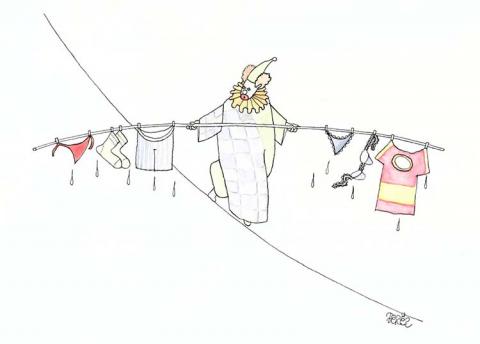
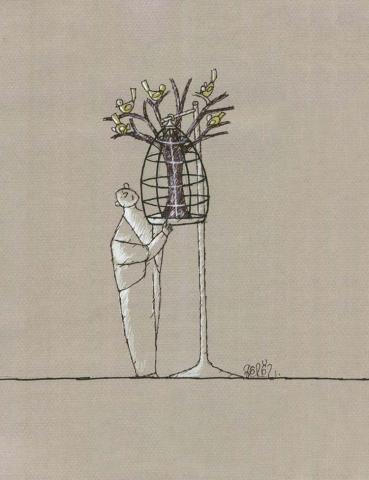
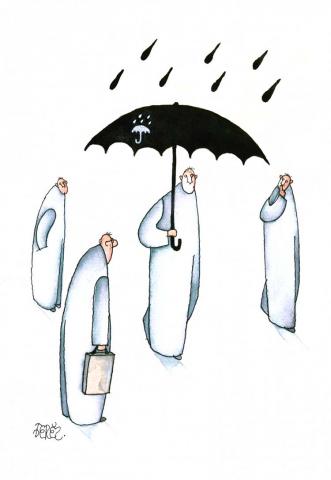
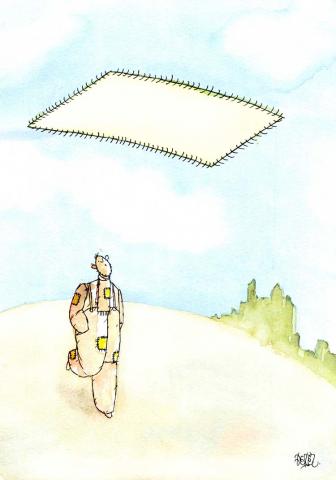
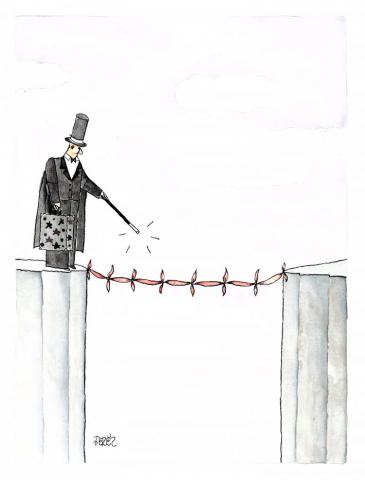
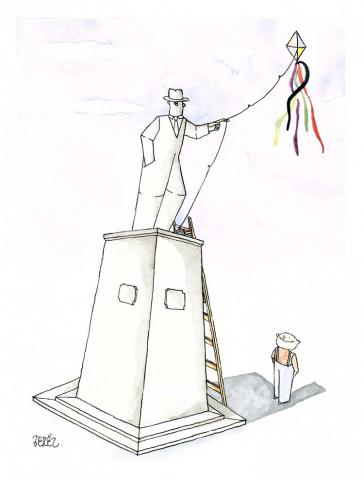
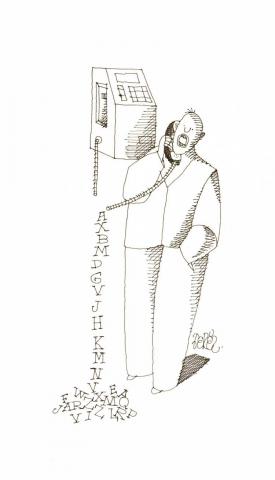
Interview with Alberto Jerez
By Pepe Pelayo
This cartoonist began publishing in 1988 in "Aspirina," a humor supplement. Later, he published in the comic book magazine "Cómicos" and in "El Muñe." However, at that time, I was not familiar with his work, as I was involved in the work of my group, La Seña del Humor de Matanzas, a group that Jerez himself later told me he followed. In 1990, he began publishing in the humor weekly Palante, in dedeté, Bohemia, etc. That’s when I "discovered" him and immediately became a fan. Through the Internet, I learned that he even founded a humor supplement, "Otro más Otro," for the Mexican newspaper Uno más Uno. He has continued publishing in other international outlets. I know he has held numerous solo and group exhibitions, both nationally and internationally. He has also won several awards in international competitions.
We kept in touch, and finally, we met in Miami, where we were able to hug, as he kindly attended the opening of an exhibition of my humorous photomontages in 2018.
(This face-to-face interview took place in 2011.)
PP: I always like to start with this: do you enjoy being interviewed?
JEREZ: Yes, why not? I don’t mind.
PP: Great! That makes me feel more at ease. Let’s start: How do you see the current state of humor in the U.S.—in television, radio, theater, literature, and graphics this year?
JEREZ: Terrible. Everything is manipulated by the big corporations.
PP: Wow! I can see this topic bothers you, and you're probably right. Let me shift the focus to avoid "pressing that sore spot." In several Latin American countries, it’s often said, "My country is a nation of comedians," or "In my country, you turn over a stone, and a comedian pops out." Is there a similar sentiment in the United States?
JEREZ: Not at all.
PP: You seem very talkative today, ha, ha. Let me dive into the theory of humor for a moment... Is the famous phrase true: "It's easier to make someone cry than to make them laugh"?
JEREZ: I think so, and I strongly agree.
PP: What more can be said, right? But I always try to share my opinion, my friend. I think that for a creator of drama and tragedy, it’s just as difficult to make someone cry as it is to make them laugh. It depends on talent, coming up with a good idea, the emotional state of the audience, etc. However, in "the penalty area," as soccer fans say, one finds that in real life, ideas, topics, and arguments tend to lean more toward the tragic and dramatic than the comedic. Tragedies—and therefore negative emotions—reach us more frequently and with more justification than positive ones. On the other hand, when theorizing, we see that humor has a language of artistic creation that tragedy or drama lacks (not referring to comedy as drama). Humor is an art within another art, something that doesn’t happen with tragedy or drama. That’s why I also think it’s harder to make someone laugh when they’re sad or angry than to make someone sad when they’re happy. Anyway, it’s a topic for further reflection, perhaps another time, right? Well, let’s continue with the great Jerez. When did you decide to become a humorist?
JEREZ: It wasn’t a decision; I think I was born a humorist.
PP: And you were born laconic, too. But to continue with “births,” do you think a humorist is born or made?
JEREZ: Humorists are born, although some develop through life experiences.
PP: What has been the best and worst moment of your career so far?
JEREZ: The best was when I was awarded the Grand Prize in Belgium in 2001. The worst was when I had to pause my career to settle in the United States.
PP: What can I say? Only that with your talent, you can succeed despite external obstacles... Now tell me, Jerez, as a humor professional, do you laugh easily? What kind of jokes make you laugh?
JEREZ: Yes, I laugh quite easily, but I prefer good jokes.
PP: Any anecdote related to your profession?
JEREZ: At this moment, I can’t recall anything special. If I remember something, I’ll let you know later.
PP: (For the record, he never sent it, ha, ha.) By the way, which colleagues do you identify with the most?
JEREZ: Graphically, with Miroslav Barták, and in performance, with the late Benny Hill.
PP: Very well. To wrap things up, what advice would you give me as a humorist?
JEREZ: Keep doing your work as you’ve been doing so far.
PP: I’ll try, my friend. And thank you so much for your time and effort in being here with me for this face-to-face.
A big hug, and I wish you lots of luck, health, and success.
(This text has been translated into English by Google Translate)

